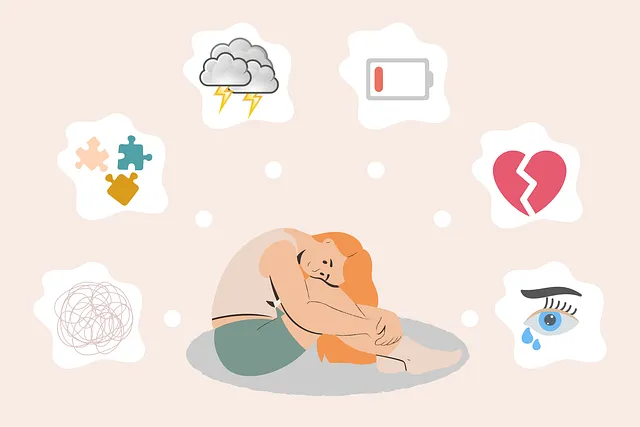Burnout among healthcare providers, especially psychiatrists, as highlighted in Parker Kaiser Permanente psychiatry reviews, is a pressing issue characterized by emotional exhaustion and reduced personal accomplishment. To combat this, evidence-based strategies like Mind Over Matter Principles, Conflict Resolution Techniques, and Mental Health Education Programs are crucial for fostering resilience, self-care, and positive relationships. A supportive work environment, regular staff meetings, access to mental wellness tools, and holistic practices enhance job satisfaction and reduce burnout risk. Maintaining long-term wellness through exercise, mindfulness, and adequate sleep is vital, along with self-care techniques and tailored risk management planning.
“Healthcare provider burnout is a growing concern, as highlighted by recent studies from the Parker Kaiser Permanente Psychiatry Reviews. This article delves into the pressing issue of burnout among medical professionals, examining its causes and offering practical solutions. We explore risk factors and triggers, drawing insights from key research. Additionally, evidence-based strategies for prevention are presented, emphasizing best practices and organizational interventions. The discussion extends to creating supportive work environments and promoting long-term wellness through lifestyle changes and self-care techniques.”
- Understanding Burnout Among Healthcare Providers: A Look at the Stats from Parker Kaiser Permanente Psychiatry Reviews
- Identifying Risk Factors and Triggers for Burnout in Medical Professionals
- Evidence-Based Strategies to Combat Burnout: Best Practices and Interventions
- Creating a Supportive Work Environment: Roles of Organizations, Colleagues, and Mentors
- Long-Term Wellness and Resiliency: Lifestyle Changes and Self-Care Techniques for Healthcare Providers
Understanding Burnout Among Healthcare Providers: A Look at the Stats from Parker Kaiser Permanente Psychiatry Reviews

Burnout among healthcare providers is a growing concern, as highlighted by various studies, including those conducted by Parker Kaiser Permanente Psychiatry Reviews. These reviews consistently reveal alarming rates of burnout, with significant implications for both provider well-being and patient care. The statistics paint a concerning picture, showing that healthcare professionals, especially psychiatrists, are at a heightened risk of experiencing chronic stress, leading to emotional exhaustion, depersonalization, and reduced personal accomplishment.
The Parker Kaiser Permanente studies underscore the pressing need for effective prevention strategies. Implementing Mind Over Matter Principles, Conflict Resolution Techniques, and well-designed Mental Health Education Programs can play a pivotal role in combating burnout. These initiatives aim to foster resilience, improve coping mechanisms, enhance interpersonal relationships, and promote self-care practices among healthcare providers.
Identifying Risk Factors and Triggers for Burnout in Medical Professionals

Healthcare provider burnout is a growing concern within the medical community, with many factors contributing to this issue. Identifying risk factors and triggers is a crucial step in developing effective prevention strategies. Medical professionals, like those reviewed by Parker Kaiser Permanente in their psychiatry practices, often face high-stress environments and demanding workloads, which can lead to chronic stress and burnout over time.
Various elements can precipitate burnout, including excessive patient load, long working hours, lack of control over work processes, insufficient rewards or recognition, and a negative job climate. The constant exposure to traumatic situations and emotional demands of caring for patients’ mental health can further exacerbate these factors. Therefore, fostering positive thinking and building resilience are essential components in burnout prevention, as they empower healthcare providers to cope with stress and maintain a healthy work-life balance.
Evidence-Based Strategies to Combat Burnout: Best Practices and Interventions

Healthcare provider burnout is a growing concern, yet evidence-based strategies can effectively combat this issue. Studies, such as those reviewed by Parker and Kaiser Permanente’s psychiatry teams, highlight the importance of integrating holistic practices into clinical workflows. Best practices include implementing emotional regulation techniques, like mindfulness meditation and cognitive behavioral therapy (CBT), to help providers manage stress and maintain a sense of well-being.
Additionally, fostering self-care routine development for better mental health is crucial. This involves encouraging regular exercise, adequate sleep, and healthy eating habits. Conflict resolution techniques also play a significant role in preventing burnout by promoting effective communication and positive interpersonal interactions within the healthcare team. These strategies, backed by research, can enhance job satisfaction and overall resilience among healthcare providers.
Creating a Supportive Work Environment: Roles of Organizations, Colleagues, and Mentors

Creating a supportive work environment plays a pivotal role in preventing healthcare provider burnout, especially for specialists like those at Parker Kaiser Permanente psychiatry departments, as highlighted in numerous reviews. Organizations have a collective responsibility to foster such an environment by promoting work-life balance, encouraging open communication, and providing adequate resources. This includes regular staff meetings where concerns can be voiced and addressed, ensuring access to mental wellness journaling exercises for stress management, and offering crisis intervention guidance when needed.
Colleagues and mentors also contribute significantly. Peer support systems and collaborative practices create a sense of belonging and reduce feelings of isolation. Mentors, especially those with experience in the field, can offer valuable guidance on managing workloads and maintaining professional resilience. Incorporating cultural sensitivity in mental healthcare practice is another key aspect, ensuring that providers feel valued for their diverse perspectives and skills, which further enhances job satisfaction and reduces burnout risk.
Long-Term Wellness and Resiliency: Lifestyle Changes and Self-Care Techniques for Healthcare Providers

Maintaining long-term wellness and resilience is paramount for healthcare providers to prevent burnout. Beyond the confines of clinical practice, adopting a holistic approach to mental wellness is essential. Incorporating regular exercise, mindfulness practices, and adequate sleep into daily routines can mitigate stress levels and enhance overall well-being.
Self-care techniques, such as journaling and seeking guidance from mental wellness coaching programs, offer valuable outlets for processing emotional experiences. Moreover, development of robust risk management planning tailored to the unique challenges faced by mental health professionals is crucial. Drawing insights from resources like Parker Kaiser Permanente psychiatry reviews can provide practical strategies for navigating these complexities, ultimately fostering a sustainable career trajectory.
Burnout among healthcare providers is a growing concern, as highlighted by studies like those from Parker Kaiser Permanente Psychiatry Reviews. By identifying risk factors, implementing evidence-based strategies, fostering supportive work environments, and promoting long-term wellness, organizations and individuals can effectively combat burnout. Adopting best practices, encouraging self-care, and nurturing a culture of support are essential steps to ensure healthcare professionals can thrive in their careers without succumbing to the pressures of their roles.




